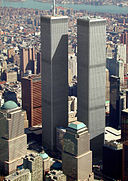 For a long time I refused to believe that the world had changed on September 11, 2001. I now think I was wrong, though I still feel no solidarity with the belief that “they” attacked us because “they” hate “our” freedom. But I’m not going to make a list of the ways I now think the world has changed. I’m rather going to observe that it’s sometimes well to remember what was there before, without embellishment or romantic enhancement. The thumbnail on the left links to a photograph of the World Trade Center towers as they appeared to one photographer in March, 2001. No drama, no klieg lights. I have included it as a rather large file for the sake of clarity (Source: Wikipedia Commons).
For a long time I refused to believe that the world had changed on September 11, 2001. I now think I was wrong, though I still feel no solidarity with the belief that “they” attacked us because “they” hate “our” freedom. But I’m not going to make a list of the ways I now think the world has changed. I’m rather going to observe that it’s sometimes well to remember what was there before, without embellishment or romantic enhancement. The thumbnail on the left links to a photograph of the World Trade Center towers as they appeared to one photographer in March, 2001. No drama, no klieg lights. I have included it as a rather large file for the sake of clarity (Source: Wikipedia Commons).
The towers’ presence in this memorial bespeaks an absence as profound as that which sent me in search of the poetry of my country twelve years ago, words from Carl Sandburg, William Allen White, Henry Longfellow, Abraham Lincoln, James Agee, Martin Luther King, Walt Whitman, the prince of all our poets. They speak of a once and future republic, of our collective triumphs and our failures, from which they (mostly) do not shrink. They do not speak with one voice. I grew up singing Lowell’s hymn in response to the Mexican-American War right along side “The Battle Hymn of the Republic,” each of which has had its jingoistic uses.
But there is poetry in the memory of those great towers. I experienced them for the first time as a disembarked subway passenger, walking a board path through the great hollow darkness underneath them building, here and there lit with fires in big oil drums and the sparks from toiling arc welders. That memory shades their absence for me now. I may one day see the new Center, but it will not replace the former in my mind or do anything to fill the hole in the world that the absence of the towers inscribes upon my mental landscape. For that I can only mourn.
But I reached for poetry for a reason more profound than mourning, and I am thinking as I reach for it now of a sentence of the late Richard Rorty’s: “[I]t is only those who agree with Hölderlin that ‘what abides was founded by poets’ who are still capable of liberal hope.”†For Rorty, our country’s founding poet was Walt Whitman. Perhaps it is not by accident that at the center of my reflections twelve years ago I found these lines from “Crossing Brooklyn Ferry”:
You have waited, you always wait, you dumb, beautiful ministers! you novices!
We receive you with free sense at last, and are insatiate henceforward;
Not you any more shall be able to foil us, or withhold yourselves from us;
We use you, and do not cast you aside—we plant you permanently within us;
We fathom you not—we love you—there is perfection in you also;
You furnish your parts toward eternity;
Great or small, you furnish your parts toward the soul.
Whitman believed in democracy. He thought democracy held the key to human flourishing and human happiness. And not mere political democracy, but social democracy shaped and guided by social justice, wherein the goods of this life are available to the least as to the great. Utopian, perhaps; flawed, certainly. But it is the dream that built our cities, our systems of transportation, our schools, colleges, libraries and other cultural institutions, our networks of homes and businesses, and much, much more without which the people perish.
One’s-Self I sing, a simple separate person,
Yet utter the word Democratic, the word En-Masse.
Rorty reminds us that Emerson distinguished between the party of memory and the party of hope. I think of Whitman returning to Brooklyn at twilight and how his imaging of his beloved New York is parceled into persons, some his human countrymen, some their built works before him and behind him on the water and in time. I am mostly of the party of hope. For me the absent towers of the World Trade Center furnish their parts towards the soul of the republic of my dreams, still to be achieved.
†In Achieving Our Country, (Cambridge, MA, Harvard University Press, 1998) 139-140.

Thanks. I believe you mean September 11, 2001, not 2011
Gosh, I certainly did.
Beautiful, Julian.
Thank you, Dayna.